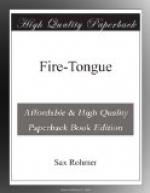Indeed, the truth was all too apparent. Sir Charles Abingdon was almost past speech. He was glaring across the table as though he saw some ghastly apparition there. And now with appalling suddenness he became as a dead weight in Harley’s supporting grasp. Raspingly, as if forced in agony from his lips:
“Fire-Tongue,” he said . . . “Nicol Brinn...”
Benson, white and terror-stricken, bent over him.
“Sir Charles!” he kept muttering. “Sir Charles! What is the matter, sir?”
A stifled shriek sounded from the doorway, and in tottered Mrs. Howett, the old housekeeper, with other servants peering over her shoulder into that warmly lighted dining room where Sir Charles Abingdon lay huddled in his own chair—dead.
CHAPTER III. SHADOWS
“Had you reason to suspect any cardiac trouble, Doctor McMurdoch?” asked Harley.
Doctor McMurdoch, a local practitioner who had been a friend of Sir Charles Abingdon, shook his head slowly. He was a tall, preternaturally thin Scotsman, clean-shaven, with shaggy dark brows and a most gloomy expression in his deep-set eyes. While the presence of his sepulchral figure seemed appropriate enough in that stricken house, Harley could not help thinking that it must have been far from reassuring in a sick room.
“I had never actually detected anything of the kind,” replied the physician, and his deep voice was gloomily in keeping with his personality. “I had observed a certain breathlessness at times, however. No doubt it is one of those cases of unsuspected endocarditis. Acute. I take it,” raising his shaggy brows interrogatively, “that nothing had occurred to excite Sir Charles?”
“On the contrary,” replied Harley, “he was highly distressed about some family trouble, the nature of which he was about to confide to me when this sudden illness seized him.”
He stared hard at Doctor McMurdoch, wondering how much he might hope to learn from him respecting the affairs of Sir Charles. It seemed almost impertinent at that hour to seek to pry into the dead man’s private life.
To the quiet, book-lined apartment stole now and again little significant sounds which told of the tragedy in the household. Sometimes when a distant door was opened, it would be the sobs of a weeping woman, for the poor old housekeeper had been quite prostrated by the blow. Or ghostly movements would become audible from the room immediately over the library—the room to which the dead man had been carried; muffled footsteps, vague stirrings of furniture; each sound laden with its own peculiar portent, awakening the imagination which all too readily filled in the details of the scene above. Then, to spur Harley to action, came the thought that Sir Charles Abingdon had appealed to him for aid. Did his need terminate with his unexpected death or would the shadow under which he had died extend now? Harley found himself staring




